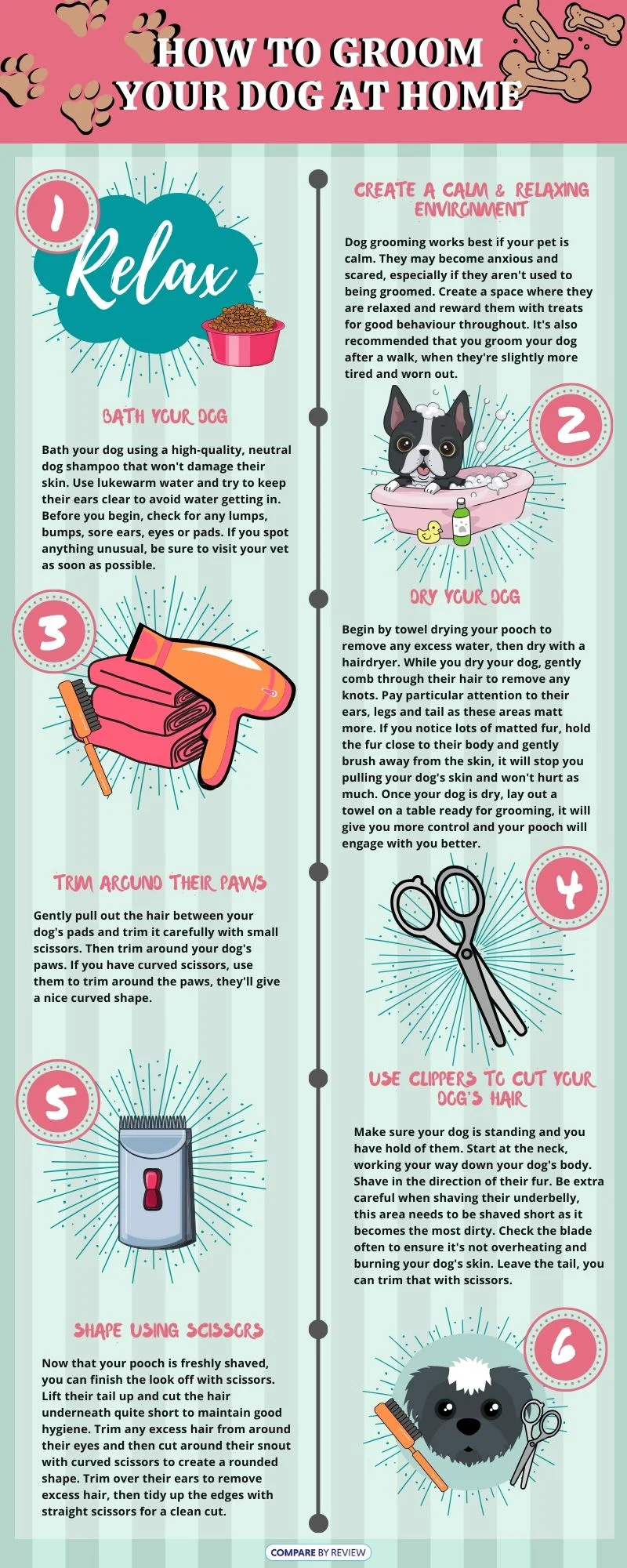
What brushes do I need for dog grooming at home?
With so many different dog grooming bushes on the market, it can be confusing knowing which ones are necessary for your pooch. The brushes that you need will vary depending on the coat type of the dog that you’re grooming. Harry Scott, Pet Product Marketing Manager from Mikki Pet, said:
“If you are unable to get your pooch to the groomer for their regular grooming session, then you will need to maintain the health of their coat at home. The brushes and tools that you have in your grooming kit will vary according to your dog’s coat type, but the key items are, a matt breaker to cut down large and difficult knots, an anti-tangle comb – this is best used to ease through the medium-sized tangled and a hard pin slicker brush which will get through minor knots and tangles whilst also removing dead hair from both the under and topcoat. The slicker brush can be used on a daily basis to leave your dog’s coat looking glossy and healthy. If your dog is the nervous type or you have a new dog that you are trying to build a bond with then a gentle grooming mitt is a great way to give your dog’s coat a massage.”
Now that we’ve got the basics out of the way, it’s time to learn how to groom your dog at home.
Dog grooming guide
1. Create a calm and relaxing environment
You’ll find dog grooming at home is much easier if your pet is calm. They may become anxious and scared, especially if they aren’t used to being groomed. Create a space where they are relaxed and reward them with treats for good behaviour throughout the grooming session. It’s also recommended that you groom your dog after a walk, when they’re slightly more tired and worn out.
The Pet Industry Federation states that it’s ‘important not to force your dog. If they appear scared or worried, then grooming little and often is best.’ Claire Lawrence, author and dog training instructor, said:
“Set your dog up for success and tire them before grooming. 10-15 minutes of sniffing games are the equivalent of an hours walk and can help to calm down your dog.”
2. Bath your dog
Dog baths at home can be stressful, but they don’t have to be. Make sure that you use lukewarm water and avoid getting any water in your dog’s ears so that they remain as calm as possible. Before you begin, check your dog for any lumps, bumps, sore ears, eyes or pads. If you notice anything out of the ordinary, be sure to visit your vet as soon as possible. You should bathe your dog using a neutral, high-quality, dog shampoo that won’t damage their skin.
3. Dry your dog
Begin by towel drying your pooch to remove any excess water, then dry them with a hairdryer. While you dry your dog, gently comb through their hair to remove any knots. Pay particular attention to their ears, legs and tail as these areas matt more. If you notice lots of matted fur, hold the fur close to their body and gently brush away from the skin, if will stop you from pulling on
your dog’s skin and won’t hurt them as much Once your dog is dry, lay out a towel on a table ready for grooming, it will give you more control and your pooch will engage with you better.
4. Trim around their paws
Gently pull out the hair between your dog’s pads and trim it carefully with small scissors. Then trim around your dog’s paws. If you have curve scissors, use them to trim around the paws, they’ll give a nice curved shape.
5. Use clippers to cut your dog’s hair
Make sure your dog is standing and you have hold of them. Start at the neck, working your way down your dog’s body. Shave in the direction of their fur. Be extra careful when shaving their underbelly, this area needs to be shaved short as it becomes the dirtiest. Check the blade often to ensure it’s not overheating and burning your dog’s skin. Leave the tail, you can trim that with scissors.
6. Shape using scissors
Now that your pooch is freshly shaved, you can finish the look off with scissors. Lift their tail up and cut the hair underneath quite short to maintain good hygiene. Trim any excess hair from around their eyes and then cut around their snout with curved scissors to create a rounded shape. Trim over their ears to remove excess hair, then tidy up the edges with straight scissors for a clean cut.
And there you have it! We hope that grooming your dog at home is as stress-free as possible and that this dog grooming manual has been of use to you.
Comparing pet insurance
Whether your grooming your dog at home or taking them to the professionals, accidents can happen. The best way to protect yourself is to have a pet insurance policy in place. We’ve ranked providers exclusively on product quality and customer experiences, taking into account reviews from real customers, so you can get a policy from an insurer that will be there when you need them most.
Review Score
Cheapest Dog Quote*
Cheapest Cat Quote**
Maximum Vet Fees
Cover From
Review Score
Cheapest Dog Quote*
Cheapest Cat Quote**
Maximum Vet Fees
Cover From
Review Score
Cheapest Dog Quote*
Cheapest Cat Quote**
Maximum Vet Fees
Cover From
**The quote received provides lifetime cover for accidents and illnesses for a 5-year-old moggie who has been spayed and chipped, cost £600 and lives at a CM postcode.
Was this article helpful?


